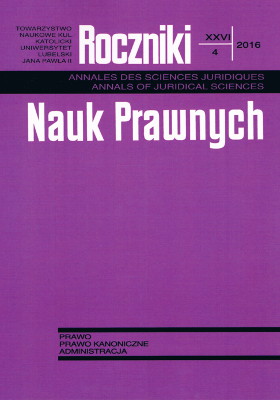El futuro de los acuerdos entre el Estado Español y la Santa Sede. Asuntos económicos y culturales (según los programas de los partidos políticos a las elecciones generales del 2015)
The Future of the Agreements Between Spain and Holy See. Economic and Cultural Affairs (According to the Programs of the Political Parties on the General Elections in 2015)
Author(s): Remigio Beneyto BerenguerSubject(s): Law, Constitution, Jurisprudence, International Law, Canon Law / Church Law
Published by: Towarzystwo Naukowe KUL & Katolicki Uniwersytet Lubelski Jana Pawła II
Keywords: Spain; Church; concordats; elections; taxes; heritage; teaching of religion
Summary/Abstract: Prof. Remigiusz Beneyto Berenguer, professor of law on religion at the Cardinal Herrera University in Valencia, since 2015 the member of the Royal Academy of Jurisprudence and Legislation, analyzes the propositions of the political parties, presented in the election programs concerning the changes in economic affairs (taxes, tax exemptions and tax burden) and in the treaty regulating the teaching of religion within the school system and the issues relating to the culture, including historical and artistic heritage. In the conclusions he stated that the introduction of the proposed abolition of the tax deduction for religious organizations will cause worse position of these organizations in relation to the other non-profit entities. This proposition shows ignorance of the apostolate and charitable activities of religious communities, but also a lack of awareness that in fact they support the actions for which the public authorities are responsible. On the other hand, the inclination to introduce by the left-wing parties the state monopoly on public education, is threatening with depriving of parents’ freedom to choose the educational centers, freedom to create them, equality of opportunities, freedom of educate their children in accordance with their religious beliefs. The history of the requisitioned goods, falling into ruin or improperly used shows that there is no need to confiscate the church buildings being the artistic and cultural heritage.
Journal: Roczniki Nauk Prawnych
- Issue Year: 26/2016
- Issue No: 4
- Page Range: 7-33
- Page Count: 27
- Language: Spanish

